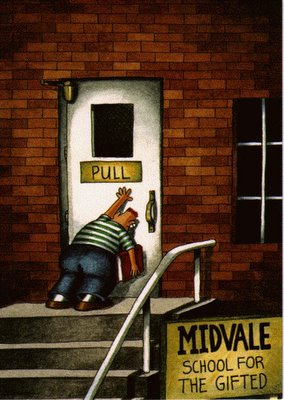Dear Mr. Harper,
It seems you’ve found yourself in a position of great potential power again, and this time you've learned from past experiences. While I can’t say I agree with all of them, your GST cut, tough stance on same-sex marriage, and tax cut approach to child care show that your platform comprises more than simply not being Paul Martin. Your physical makeover appears to have hit the mark…even
Margaret Wente thinks you’re a hottie.
Acknowledging all your progress, I can’t help but point out a fundamental (if not widely recognized) weakness that still haunts your cause; most Canadians still have a really, really hard time picturing you as the leader of their country.
While I still hold some animosity towards Rick Mercer for leaving
This Hour Has 22 Minutes, he did make a rather poignant observation in a recent episode of the
Rick Mercer Report; that Canadians could easily find themselves looking forward to two leadership campaigns and two federal elections within the next 24 months. If, as accepted by most as one of two likely outcomes, the Liberals win a minority government, we will almost certainly see Paul Martin’s tenure come to an anti-climatic close by way of a leadership review, with his successor surely calling a quick election to secure a mandate from the people. If the Tories win a minority government, the other widely accepted likely outcome, as Mercer put it, your government would last as long as the lifespan of a fruitfly (it may have been butterfly…I’m not sure).
Which brings me to my advice…the NDP and Bloc aside, this election really isn’t so much about the current party leaders as it is about their potential successors. To win over the hearts and minds of Canadians, show them now what the future of the party holds. Mounting polls show that the biggest threat to the Liberal incumbency has nothing to do with the sponsorship scandal; it’s a universal desire for change.
Unfortunately for you Mr. Harper, you’re just not the person Canadians see as being the end product of that change. The antagonist, yes…the successor, no.
Also unfortunately for you, the Liberals seem to have no shortage of suitors to the throne. Recently parachuted Michael Ignatieff – while I’m still not sure I see the connection – is already being touted as a future PM, a Trudeau incarnate. You can be certain that John Manley will be an instant contender upon throwing his hat in the ring. I would be surprised if one or both of Tobin or McKenna, both strong characters with loyal supporters, don’t consider a run at the post too.
On the Tory side, there are more challenges than candidates. Granted, Peter MacKay has party leadership written all over him, but for the time being he’s a bit young, still a bit stung from the Belinda breakup, and quite frankly….too loyal to you. Bernard Lord would have been a highly credible candidate, if not for the recent byelection that effectively forces him to stay in office to keep the New Brunswick Tories in power.
So Mr. Harper, to reiterate: find someone, anyone, in the Conservative party whom you think Canadians could realistically see as their next Prime Minister and make that guy (in the gender-neutral sense) the clear heir to the thrown. Don’t secede the leadership, but make it abundantly clear that the Tories are quickly going to evolve from toppling mode to governance mode, complete with a PM-style leader poised to take the helm.



